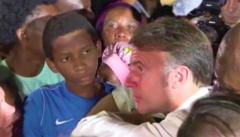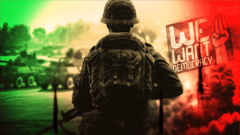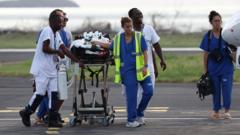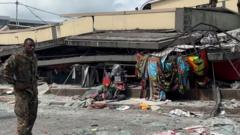The plight of children in Sudan is exacerbated by a brutal conflict resulting in widespread displacement and acute hunger. Despite the challenges faced by humanitarian efforts, there's a concerted push to deliver aid to the affected populations, as calls for international attention grow louder.
Sudan's Unseen Struggle: Children Displaced by War in Record Numbers
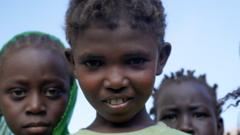
Sudan's Unseen Struggle: Children Displaced by War in Record Numbers
Over five million children in Sudan are forced to flee their homes amidst the escalating humanitarian crisis.
In Sudan, a nation torn apart by violent conflict, tragedy unfolds daily as more than five million children have been forcibly displaced from their homes. This phenomenon has led to what many describe as the "invisible crisis," marked by dire humanitarian conditions, particularly acute hunger. The grinning face of Mahmoud, a 13-year-old orphan who has faced abandonment and displacement, serves as a poignant reminder of the suffering endured by so many young lives in Sudan.
Tom Fletcher, the newly appointed UN humanitarian chief, has emphasized the urgent need for aid, highlighting that over half of Sudan’s population, totaling around 25 million people, require immediate assistance. As the world’s attention remains fixed on other global conflicts, such as those in Gaza and Ukraine, Fletcher deemed it essential to prioritize Sudan during his first field mission. “This crisis is not invisible to the UN; our humanitarians on the frontlines are risking their lives to assist the Sudanese people,” he asserted during his visit.
Fletcher’s journey took him to an orphanage sheltering nearly 100 children in Kassala, where he met children like Mahmoud, who dream of rebuilding their shattered homes. The ongoing conflict, driven by fierce power struggles between the Sudanese army and paramilitary groups, has challenged the safety and survival of these vulnerable populations. The children, once situated in Khartoum, have been displaced twice as violence escalates, leading to horrific conditions, including systematic looting and abuse.
The humanitarian landscape remains grim, as aid agencies grapple with the logistics of delivering food and resources amidst ongoing violence. A recent announcement by army chief Gen Abdel Fattah al-Burhan allows the UN to establish more supply hubs and utilize additional airports for aid distribution, yet the overwhelming challenges pose a constant battle for those trying to survive.
Criticism surrounds the UN's handling of the situation, with some arguing that recognizing Burhan as de facto ruler complicates aid access. Fletcher acknowledged that the UN must navigate these political labyrinths to deliver crucial assistance. He expressed hope that rival forces prioritize humanitarian efforts over conflicts. The struggle is further compounded by allegations that starvation is being weaponized against civilians in the war.
In a heart-wrenching display of resilience, local aid workers like Romissa urge for collective action by the Sudanese people. Programs like "Shamaa," a safe house for abused women and orphans, represent the grassroots efforts being made to combat the humanitarian crisis, though challenges continue to mount. Mama Nour, the founder of Shamaa, expresses a deep sense of exhaustion while pleading for assistance: “We want to smell the fresh air. We want to feel there are still people in the world who care about us.”
As calls for help become more urgent, the ongoing “16 days of activism” against gender-based violence echoes the broader struggles faced by Sudanese women and children caught in this humanitarian maelstrom. With the international community urged to lift the veil off Sudan's invisible crisis, hope remains fragile as the region faces one of the most devastating humanitarian dilemmas of our time.
Tom Fletcher, the newly appointed UN humanitarian chief, has emphasized the urgent need for aid, highlighting that over half of Sudan’s population, totaling around 25 million people, require immediate assistance. As the world’s attention remains fixed on other global conflicts, such as those in Gaza and Ukraine, Fletcher deemed it essential to prioritize Sudan during his first field mission. “This crisis is not invisible to the UN; our humanitarians on the frontlines are risking their lives to assist the Sudanese people,” he asserted during his visit.
Fletcher’s journey took him to an orphanage sheltering nearly 100 children in Kassala, where he met children like Mahmoud, who dream of rebuilding their shattered homes. The ongoing conflict, driven by fierce power struggles between the Sudanese army and paramilitary groups, has challenged the safety and survival of these vulnerable populations. The children, once situated in Khartoum, have been displaced twice as violence escalates, leading to horrific conditions, including systematic looting and abuse.
The humanitarian landscape remains grim, as aid agencies grapple with the logistics of delivering food and resources amidst ongoing violence. A recent announcement by army chief Gen Abdel Fattah al-Burhan allows the UN to establish more supply hubs and utilize additional airports for aid distribution, yet the overwhelming challenges pose a constant battle for those trying to survive.
Criticism surrounds the UN's handling of the situation, with some arguing that recognizing Burhan as de facto ruler complicates aid access. Fletcher acknowledged that the UN must navigate these political labyrinths to deliver crucial assistance. He expressed hope that rival forces prioritize humanitarian efforts over conflicts. The struggle is further compounded by allegations that starvation is being weaponized against civilians in the war.
In a heart-wrenching display of resilience, local aid workers like Romissa urge for collective action by the Sudanese people. Programs like "Shamaa," a safe house for abused women and orphans, represent the grassroots efforts being made to combat the humanitarian crisis, though challenges continue to mount. Mama Nour, the founder of Shamaa, expresses a deep sense of exhaustion while pleading for assistance: “We want to smell the fresh air. We want to feel there are still people in the world who care about us.”
As calls for help become more urgent, the ongoing “16 days of activism” against gender-based violence echoes the broader struggles faced by Sudanese women and children caught in this humanitarian maelstrom. With the international community urged to lift the veil off Sudan's invisible crisis, hope remains fragile as the region faces one of the most devastating humanitarian dilemmas of our time.







